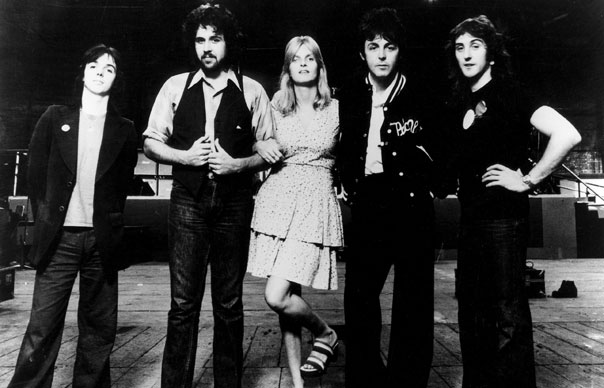In this exclusive interview from Uncut’s June 2007 issue, the Beatles legend recalls his controversial time as leader of Wings. “It was a strange period,” he admits… Interview by David Cavanagh ____________________ March 15, 2007. Soho Square is bathed in buoyant sunshine as a few lunchtim...
On November 8, 1971, the McCartneys launched their new band, Wings, at the Empire Ballroom, Leicester Square. Completing the quartet’s line-up were New York drummer Denny Seiwell and ex-Moody Blues singer/guitarist Denny Laine. The Empire, with its roots in Victorian music hall and Lumière Brothers moving pictures, provided a suitably historic setting for Wings’ inauguration.
But when their first album, Wild Life, appeared in December, it was patently substandard. Denny Seiwell tells Uncut that five of the eight songs were first takes. The rock papers savaged it. “This is not even acceptable pop music,” wrote one reviewer. McCartney was undaunted. Wings were going on the road.
Britain was hit by a power crisis in February 1972. Affecting heat, lighting and amplification, it caused numerous gigs to be cancelled, and there were fears for musicians’ livelihoods if the situation worsened. In this context, Wings debuted on February 9. They had a new member, Henry McCullough (lead guitar), but no manager or booking agent. They travelled in two vans –musicians, wives, children, dogs, roadies. On the M1, seeing signs for Nottingham, McCullough suggested they try Nottingham University.
“How do you ‘do a band’ was the question,” explains McCartney on the subject of Wings’ low-key, morale-boosting University Tour. “You could do the supergroup thing like Jimmy Page and Eric Clapton. Or you could return to your roots – and that’s what I was doing. I wanted to get away from being huge in The Beatles, and experience being at the bottom again. It was like leaving a very posh job and going to work on the streets.”
The scenario went like this. Wings pull into a uni campus. Their roadies ask the students’ union if they’d like a band to play. “No thanks.” “It’s Paul McCartney.” “Whaat?” Student comes out to the van, sees McCartney, grins in disbelief. It is agreed Wings will play for 50p on-the-door, tonight or tomorrow, whichever is convenient, mate. Wings look for somewhere to spend the night.
“We didn’t stay in many hotels,” Henry McCullough laughs. “It was mostly Mrs Murphy’s bed-and-breakfast. But it was fantastic, like a little English magical mystery tour. Only a man like McCartney could have done it.”
“We were having a great laugh,” McCartney enthuses. “This is what I thought it was going to be about. Camaraderie. A baptism of fire. Learning to play together, getting a chemistry. We only had a few numbers. We had to repeat some of them, pretending they were requests.”
Wings released their first single, “Give Ireland Back To The Irish”, that month. A horrified McCartney’s response to Bloody Sunday (January 30), when 13 civil rights protestors in Derry were shot dead by British soldiers, the song proved bitterly controversial. EMI reluctantly sanctioned its release, but as Northern Ireland teetered on the brink, the single was given no exposure whatsoever. Radio 1’s chart show wouldn’t even mention its title. McCartney was unrepentant. “My family comes from Ireland,” he reasons today. “Half of Liverpool comes from Ireland. That was the shocking thing. We were fighting us. And we’d killed them, very visibly, on the news.”
Wings lay low. The University Tour had created an ‘issue’ in the band, one that successive line-ups would all have to face. Linda McCartney was a novice-standard prodder of a keyboard, and tended to sing waywardly onstage. As everyone from band-members to road crew gritted their teeth, the stoical Linda became the butt of countless jokes during Wings’ lifetime. Henry McCullough remembers losing his temper and telling McCartney to hire a proper piano player. He was told to sit down and shut up.



